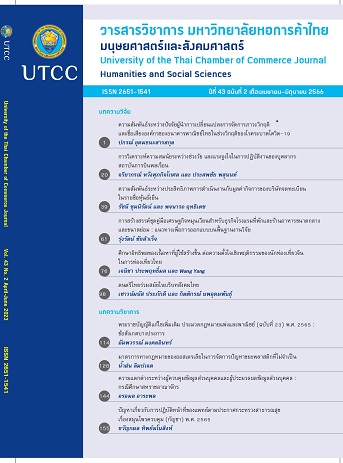การวิเคราะห์ความสมนัยระหว่างช่วงวัย และแรงจูงใจในการปฏิบัติงานของบุคลากร สถาบันการบินพลเรือน
Main Article Content
บทคัดย่อ
งานวิจัยในครั้งนี้มีวัตถุประสงค์เพื่อวิเคราะห์ความสมนัยระหว่างช่วงวัยและแรงจูงใจในการปฏิบัติงานของบุคลากร เป็นงานวิจัยเชิงปริมาณ กลุ่มตัวอย่าง คือ พนักงาน บุคลากร สถาบันการบินพลเรือน จำนวน 175 คน โดยช่วงวัยประกอบด้วย Generation Y และ Generation X เครื่องมือที่ใช้ในการเก็บข้อมูล คือ แบบสอบถาม วิเคราะห์ข้อมูลด้วยความสมนัย ผลการวิจัยพบว่า 1) ช่วงวัยมีความสัมพันธ์กับปัจจัยจูงใจ ลักษณะงานที่มีความท้าทาย ขอบเขตภาระงานที่ชัดเจน การสนับสนุนความก้าวหน้าหรือผลตอบแทนจากผลงาน และการได้รับการยอมรับหรือคำชมเชย ที่ระดับนัยสำคัญ 0.05 2) ช่วงวัยมีความสัมพันธ์กับปัจจัยค้ำจุน ความรู้สึกมั่นคงและมั่นใจในงาน การปรับโครงสร้างเงินเดือน การตอบแทนเงินพิเศษและ สิ่งอำนวยความสะดวกและสภาพแวดล้อมในการปฏิบัติงาน ที่ระดับนัยสำคัญ 0.05
Article Details

อนุญาตภายใต้เงื่อนไข Creative Commons Attribution-NonCommercial-NoDerivatives 4.0 International License.
ลิขสิทธิ์ของบทความ
ผลงานที่ได้รับการตีพิมพ์ถือเป็นลิขสิทธิ์ของมหาวิทยาลัยหอการค้าไทย ห้ามมิให้นำเนื้อหา ทัศนะ หรือข้อคิดเห็นใด ๆ ของผลงานไปทำซ้ำ ดัดแปลง หรือเผยแพร่ ไม่ว่าทั้งหมดหรือบางส่วนโดยไม่ได้รับอนุญาตเป็นลายลักษณ์อักษรจากมหาวิทยาลัยหอการค้าไทยก่อน
เอกสารอ้างอิง
เดชา เดชะวัฒนไพศาล, กฤษยา นุ่มพยา, จีราภา นวลลักษณ์, และชนพัฒน์ ปลื้มบุญ. (2557). การศึกษาเจนเนอเรชั่นเอ็กซ์และเจนเนอเรชันวายในมุมมองต่อคุณลักษณะ ของตนเองและความคาดหวังต่อคุณลักษณะของเจนเนอเรชั่นอื่น. จุฬาลงกรณ์ธุรกิจปริทัศน์, 36(141), 1-17.
ประสพชัย พสุนนท์. (2557). ความเชื่อมั่นของแบบสอบถามในการวิจัยเชิงปริมาณ. วารสารปาริชาต มหาวิทยาลัยทักษิณ, 27(1), 143-163.
ประสพชัย พสุนนท์, อาฟีฟี ลาเต๊ะ, และ เกตุวดี สมบูรณ์ทวี (2559). การประยุกต์เทคนิคการวิเคราะห์การสมนัยในการวิจัยทางสังคมศาสตร์. วารสารบัณฑิตศึกษาการจัดการ MBA-KKU มหาวิทยาลัยขอนแก่น, 9(1), 1-22.
พิชชาภร จวงวาณิชย์. (2560). อิทธิพลของช่วงอายุต่อความสัมพันธ์ระหว่างผลตอบแทนรวมและความผูกพันต่อองค์กรในวิชาชีพบัญชี (วิทยานิพนธ์ปริญญามหาบัณฑิต ไม่ได้ตีพิมพ์). สถาบันบัณฑิตพัฒนบริหารศาสตร์, กรุงเทพฯ.
พิศมัย สารการ. (2559). การได้รับการยอมรับจากเพื่อนร่วมงานและความพึงพอใจต่อค่าตอบแทนในการพยากรณ์แรงจูงใจในการทำงานของแรงงานต่างด้าวชาวพม่าในกรุงเทพมหานคร. วารสารสุทธิปริทัศน์, 30(93), 71-85.
วรรณชัย ธุระแพง, และประสพชัย พสุนนท์. (2563). แผนภาพความสมนัยระหว่างช่วงวัยกับค่าตอบแทนและความจงรักภักดีต่อองค์กรของพนักงานรายเดือนบริษัท เอเชี่ยนอะไลอันซ์อินเตอร์เนชั่นแนล จำกัด. วารสารมหาวิทยาลัยคริสเตียน, 26(3), 55-69.
วีรยุทธ วานิชกมลนันท์. (2559). ปัจจัยที่ส่งผลต่อแรงจูงใจในการปฏิบัติงานของพนักงาน บริษัทสยามกลาสอินดัสทรี จำกัด โรงงานอยุธยา (วิทยานิพนธ์ปริญญามหาบัณฑิต ไม่ได้ตีพิมพ์). มหาวิทยาลัยธรรมศาสตร์, กรุงเทพฯ.
สถาบันการบินพลเรือน. (2566). ประวัติ สบพ. สืบค้นเมื่อ 3 มีนาคม 2566, จาก https://www.catc.or.th/th/history-of-catc/
อัครเดช ไม้จันทร์. (2560). ปัจจัยที่มีผลต่อประสิทธิภาพในการปฏิบัติงานของพนักงาน กลุ่มอุตสาหกรรมติดตั้งเครื่องจักรสายการผลิตในจังหวัดสงขลา (วิทยานิพนธ์ปริญญามหาบัณฑิต ไม่ได้ตีพิมพ์). มหาวิทยาลัยสงขลานครินทร์, สงขลา.
Acar, A. B. (2014). Do intrinsic and extrinsic motivation factors differ for generation X and generation Y. International Journal of Business and Social Science, 5(5), 12-20.
Adams, S. J. (2000). Generation X: How understanding this population leads to better safety programs. Professional Safety, 4(1), 9-26.
Akhavan Sarraf, A. R., Abzari, M., Nasr Isfahani, A., & Fathi, S. (2017). Generational differences in job engagement: A case study of an industrial organization in Iran. Industrial and Commercial Training, 49(3), 106-115. doi:10.1108/ICT-10-2016-0068
Alderfer, C. P. (1969). An empirical test of a new theory of human needs. Organizational Behavior and Human Performance, 4(2), 142–75.
Gursoy, D., Maier, T. A. & Chi, C. G. (2008). Generational differences: An examination of work values and generational gaps in the hospitality workforce. International Journal of Hospitality Management, 27(3), 48-58.
Herzberg, F., Mausner, B., & Snyderman, B. B. (1959). The motivation to work (2nd ed.). New York, NY: Wiley.
Jahya, A., Azlin, S. N. I., Othman, R., & Romaiha, N. R. (2020) Turnover intention among GenY: The role of training and development, compensation and organizational culture. International Journal of Academic Research in Business and Social Sciences, 10(10), 765-782.
Jorgensen, B. (2003). Baby boomers, generation X and generation Y? Policy implications for defence forces in the modern era. Foresight, 5(4), 41-49.
Kian, T. S., & Yusoff, W. F. W. (2012). Generation x and y and their work motivation. In Proceedings International Conference of Technology Management, Business and Entrepreneurship (pp. 396-408). Retrieved from https://www.researchgate.net/publication/262639919_Generation_X_Y_and_Their_Work_Motivation
Kim, H., Knight, D. K., & Crutsinger, C. (2009). Generation Y employees’ retail work experience: The mediating effect of job characteristics. Journal of Business Research, 62(5), 548–556.
Krejcie, R. V., & Morgan, D. W. (1970). Determining sample sizes for research activities. Educational and Psychological Measurement, 30(3), 607-610.
Lohela-Karlsson, M., Jensen, I., & Björklund, C. (2022). Do attitudes towards work or work motivation affect productivity loss among academic employees? International Journal of Environmental Research and Public Health, 19(2), 934.
Matovic, I. M., Lazarevic, A., & Djurkovic, J. V. (2022). Impact of gender and other demographic
parameters on managers’ motivation. Current Psychology. 1-12. doi:10.1007/s12144-021-026
Maslow, A. H. (1943). A theory of human motivation. Psychological Review, 50(4), 370–396.
Mohapatra, A. K., Saxena, A., Joshi, D., & Chaturvedi, N. (2017). Does job security matter for generation Y? A behavioural analysis. Pacific Business Review International, 10(5), 92-98.
Pham, T.-V., Huang, Y.-F., & Do, M.-H. (2022). The effect of critical work factors on job motivation and satisfaction: An empirical study from Vietnam. The Journal of Asian Finance, Economics and Business, 9(1), 399–408.
Sofiyah, F. R. (2022). Determination work life balance, commitment organization, work motivation and compensation financial on the job satisfaction generation millennial performance as an intervening variable (Case Study on Driver Gojek Kota Medan). Webology, 19(1), 3230-3242.
Tolbize, A. (2008). Generational differences in the workplace. Research and Training Center on Community Living, 5(2), 1-21.
Yusoff, W. F. W., & Kian, T. S. (2013). Generation differences in work motivation: From developing country perspective. International Journal of Economy, Management and Social Sciences, 2(4), 97-103.
Zemke, R., Raines, C. & Filipczak, B. (2000). Generations at work: Managing the clash of veterans, boomers, xers, and nexters in your workplace. New York, NY: Amacom Books.


